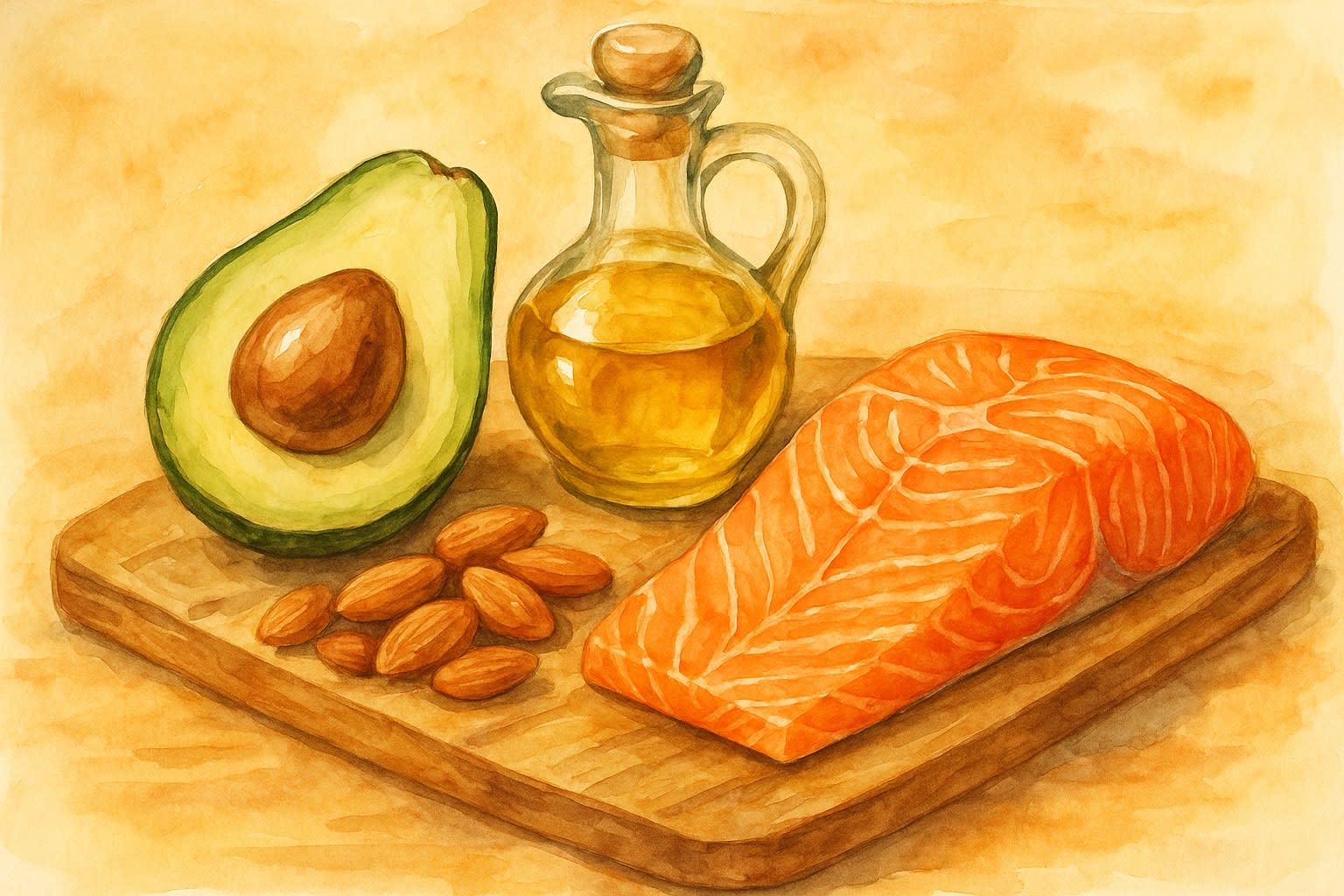Why Fat Intake is Important for Runners
When runners think about nutrition, carbohydrates and protein usually take centre stage. Carbs are prized for fuelling long runs, and protein is recognised for helping muscles recover. But fat – often overlooked or misunderstood – plays a crucial role in energy, recovery, and overall health. Understanding how much fat you should be eating, and what types, can transform your training, racing, and day-to-day wellbeing. Our Fat Intake Calculator is designed to give you clear, personalised guidance on how much dietary fat you need to support your goals.
Why Fat Matters in a Runner’s Diet

Fat isn’t just a backup fuel; it’s an essential macronutrient that supports performance and health in several key ways. Unlike carbohydrates, which are quickly depleted, fat provides a long-lasting source of energy. It also underpins hormone production, helps your body absorb vitamins, and supports recovery after tough sessions. For runners balancing high training loads, work, and family life, getting fat intake right can make the difference between feeling energised and constantly drained.
Energy and Hormone Support
Each gram of fat delivers more than double the energy of carbohydrates or protein, making it a dense fuel source. While high-intensity efforts rely heavily on carbs, longer, steady runs call on fat stores for sustained energy. Without adequate dietary fat, your body struggles to perform efficiently during endurance efforts.
Fat also drives hormone production, including testosterone and oestrogen, which regulate recovery, muscle repair, and energy balance. Runners who cut dietary fat too low often report fatigue, disrupted hormone cycles, and slower recovery between workouts. That’s why athletes training for half marathons or marathons need to pay special attention to fat intake alongside carbohydrate loading strategies.
Nutrient Absorption

Many of the vitamins that keep runners healthy – such as A, D, E, and K – are fat-soluble. That means they can only be absorbed by the body when dietary fat is present. Vitamin D supports bone health, vitamin A helps immunity and vision, and vitamin K plays a role in blood clotting and recovery from micro-tears in muscle tissue. Without enough fat, these nutrients pass through your system without being used effectively.
Healthy fat sources such as olive oil, nuts, seeds, and oily fish not only provide fuel but also ensure you’re getting the full benefits of these vitamins. For example, pairing a salad with avocado or a drizzle of extra virgin olive oil helps unlock the nutrients in your vegetables.
Performance and Satiety
Getting the right balance of fat in your diet supports a steady release of energy. This helps you fuel long training runs without constantly needing to snack. Fat also plays a role in appetite control, keeping you fuller for longer – a big help if you’re trying to manage body composition while training.
For runners trying to juggle busy days, that sense of satiety can stop you reaching for sugary snacks that give a quick energy spike but leave you feeling sluggish later. Using tools like our Running Calorie Calculator can help you see how fat fits into your wider daily energy needs.
Saturated Fat Guidance
Not all fats are created equal. Health authorities recommend limiting saturated fat to less than 10% of daily calories – ideally closer to 6% if you have a higher risk of heart disease. That doesn’t mean avoiding fat altogether; it means focusing on sources rich in unsaturated fats. Foods such as salmon, mackerel, avocado, and walnuts are not only better for your heart but also help reduce inflammation after tough sessions.
Balancing your macronutrients can feel complex, but our Weight vs Pace Calculator and Pace Calculator work hand-in-hand with our nutrition tools to show how body composition, pace, and diet interact in your training.
How Much Fat Should Runners Eat?
Fat intake recommendations depend on your body weight, daily calorie needs, and training load. In general, 20–35% of daily calories should come from fat, with an emphasis on unsaturated sources. Our Fat Intake Calculator makes this simple by giving you a target range based on your individual profile.
For example, if you’re training for a marathon and eating 2,800 calories a day, you might aim for 70–100 grams of fat daily. Out of this, less than 10% of total calories should be from saturated fat – so around 20 grams or less.
Healthy Fat Sources for Runners
Knowing your numbers is the first step; choosing the right foods is the second. Here are some excellent fat sources that also provide additional health benefits:
- Avocados – Packed with monounsaturated fat and potassium to aid muscle function.
- Oily fish such as salmon, sardines, and mackerel – Rich in omega-3 fatty acids that support joint health and reduce inflammation.
- Nuts and seeds – Portable snacks that offer a mix of fat, fibre, and micronutrients.
- Olive oil – A staple for Mediterranean diets and a versatile source of healthy fats.
Balancing Fat with Training Goals
Your ideal fat intake will shift depending on your training goals. Endurance runners may benefit from a slightly higher proportion of fat to support long sessions, while sprinters might lean more heavily on carbohydrates for explosive power. The key is balance: too little fat risks poor recovery and hormonal imbalance, while too much – particularly from unhealthy sources – can affect body composition and cardiovascular health.
Pairing our Running Plan Generator with the Fat Intake Calculator helps you align your nutrition with your training load, so your body has exactly what it needs to adapt and improve.
Frequently Asked Questions
Can eating more fat improve my endurance?
A moderate increase in healthy fats can help with endurance by providing a steady fuel source. However, fat should not replace carbohydrates, which are still critical for high-intensity efforts.
Is low-fat eating bad for runners?
Yes, overly restricting fat can lead to energy dips, slower recovery, and hormone disruption. The body needs dietary fat for basic health and athletic performance.
What’s the best way to calculate my fat needs?
Use our Fat Intake Calculator for a personalised range based on your body weight, calorie needs, and training level. This takes out the guesswork and ensures you’re fuelling correctly.
Final Thoughts
Fat is far more than a calorie-dense nutrient – it’s a cornerstone of health and performance for runners. From fuelling long runs to supporting hormone balance and nutrient absorption, it plays a role in every stride you take. By using the Fat Intake Calculator alongside other tools like the Pace Calculator and Running Plan Generator, you can take control of your nutrition and give your training the foundation it deserves.
